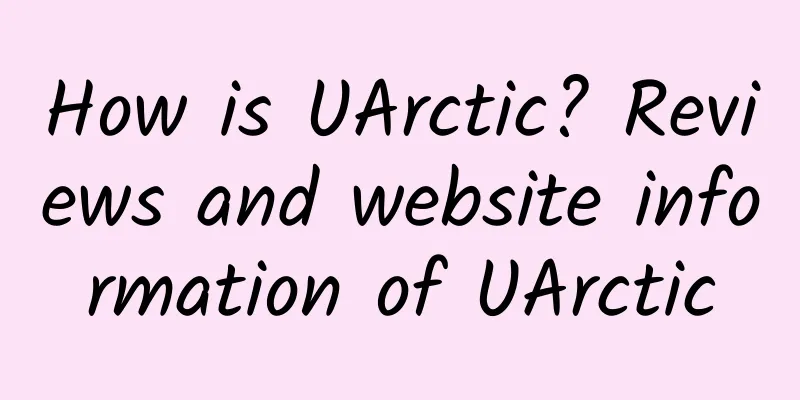How is UArctic? Reviews and website information of UArctic

|
What is UArctic? The University of the Arctic (UArctic) is an international educational organization founded in 2001 and initiated by the Arctic Council. Its international secretariat is located in Rovaniemi, Finland. It aims to improve the quality of universities within the Arctic Circle and is a collaborative network of universities, colleges and other organizations within the Arctic Circle. Website: www.uarctic.org UArctic: An international educational collaboration networkThe University of the Arctic (UArctic) is a unique international educational organization founded in 2001. It was initiated by the Arctic Council to improve the quality of higher education and research in the Arctic Circle. The international secretariat of this collaborative network is located in Rovaniemi, Finland, and is committed to promoting education, research and sustainable development in the Arctic region by uniting universities, colleges and other relevant organizations in member countries. UArctic is not just an ordinary educational institution, but also a bridge connecting global academic resources. It lays a solid foundation for the future development of the Arctic region by providing high-quality educational resources, promoting cross-cultural cooperation, and supporting research projects unique to the Arctic region. Its official website is located at www.uarctic.org , where users can obtain detailed information about UArctic, including its member institutions, educational projects, research activities, and other related information. History and Background of UArctic UniversityThe history of UArctic can be traced back to the late 1990s, when discussions on sustainable development in the Arctic region increased. Against this backdrop, the Arctic Council decided to establish an international organization dedicated to education and research in the Arctic region to address the unique challenges facing the Arctic region and promote the long-term development of the region. After years of preparation, UArctic was finally officially established in 2001. UArctic was founded with the support of several international organizations and national governments, including the Arctic nations of Canada, Denmark, Finland, Iceland, Norway, Russia, Sweden and the U.S. These nations recognize that by establishing a unified education and research platform, they can better coordinate their academic activities in the Arctic while providing more educational opportunities for residents of the Arctic. Since its inception, UArctic has grown into a large network with more than 200 member institutions, including universities, colleges, research centers and other organizations related to Arctic affairs. These member institutions are located in many countries and regions and together constitute the core strength of UArctic. UArctic's Mission and GoalsThe mission of UArctic is to promote sustainable development in the Arctic through education, research and knowledge sharing. To achieve this mission, UArctic has set the following main goals:
These goals reflect not only UArctic’s commitment to the future of the Arctic, but also its unique value as an international educational organization. The organizational structure of UArcticThe organizational structure of the University of the Arctic is complex and flexible to accommodate its broad membership base and diverse areas of activity. Its core management bodies include the International Secretariat, the Council and the Executive Committee. International Secretariat: Located in Rovaniemi, Finland, it is responsible for the daily operation and management of UArctic. The Secretariat team is composed of professionals from different countries and backgrounds. They are responsible for coordinating UArctic's activities and providing support to member institutions. The Board of Directors is the highest decision-making body of UArctic and is composed of representatives from member institutions. The Board of Directors meets regularly to review UArctic's strategic direction, policies and budget, and approve new member applications. Executive Committee: The Executive Committee is elected by the Board of Directors and is responsible for overseeing the day-to-day operations of UArctic and reporting to the Board of Directors on progress. The Executive Committee is usually composed of several senior managers from different member institutions. In addition to the core management bodies mentioned above, UArctic also has a number of thematic working groups and special committees that focus on specific areas of activity, such as climate change research, indigenous knowledge protection, and higher education innovation. These working groups and committees are composed of experts from different member institutions, ensuring that UArctic can fully cover various issues in the Arctic region. Educational Programs at UArctic UniversityUArctic offers a range of high-quality educational programs, covering all levels from undergraduate to doctoral. These programs fully utilize the resources and expertise of UArctic member institutions to provide students with a rich learning experience. Thematic Networks: This is one of UArctic's core educational programs, which aims to bring together scholars, students and practitioners with common interests to conduct in-depth discussions and cooperation around specific topics. Currently, UArctic has established multiple thematic networks covering the Arctic environment, indigenous knowledge, energy development, health and society. Master's Program in Arctic Studies: This interdisciplinary program is offered by multiple UArctic member institutions and provides students with the opportunity to gain a comprehensive understanding of the Arctic region. The program combines knowledge from natural sciences, social sciences, and humanities to help students understand the complexity and diversity of the Arctic region. Online courses and virtual classrooms: To overcome the barriers of geographical distance, UArctic actively develops online educational tools and virtual classrooms to enable students to access high-quality educational resources anytime and anywhere. This flexible learning method is particularly suitable for Arctic residents living in remote areas. In addition, UArctic also provides students with more learning and development opportunities through scholarship programs, internship opportunities and exchange programs. Research activities at the University of the Arctic_UArcticThe research activities of UArctic focus on environmental, social and economic issues in the Arctic region, striving to solve practical problems and promote sustainable development through scientific research. UArctic's research activities mainly include the following aspects:
Through these research activities, UArctic has not only made important contributions to the sustainable development of the Arctic region, but also provided valuable reference experience for similar issues in other parts of the world. International cooperation of UArcticAs an international educational organization, UArctic attaches great importance to international cooperation and has established close ties with many international organizations and national governments. UArctic's partners include UNESCO, WWF, the Arctic Council and other international organizations related to Arctic affairs. Through these partnerships, UArctic is able to obtain more resources and support to further promote its education and research activities. For example, UArctic has cooperated with UNESCO to carry out a number of educational projects aimed at improving the scientific literacy and innovation capabilities of residents in the Arctic region. In addition, UArctic has also cooperated with the World Wildlife Fund to jointly study biodiversity and ecological protection issues in the Arctic region. International cooperation not only enhances UArctic's influence, but also provides its member institutions with more opportunities to participate in global projects and activities. This open and inclusive spirit of cooperation is one of the important reasons for UArctic's success. The Future of UArcticWith the increasing global climate change and strategic importance of the Arctic region, UArctic will face more opportunities and challenges in the future. In order to cope with these changes, UArctic has formulated the following key strategies:
By implementing these strategies, UArctic hopes to play a greater role in future Arctic development and make greater contributions to the global community. In short, UArctic is a dynamic and promising international educational organization dedicated to promoting sustainable development in the Arctic through education, research and knowledge sharing. UArctic has demonstrated outstanding capabilities and leadership in educational programs, research activities and international cooperation. As the world's attention to the Arctic region continues to deepen, the importance of UArctic will become increasingly prominent. |
Recommend
How to make fresh monkey head
Hericium erinaceus is an important ingredient in ...
How is the University of Potsdam? Reviews and website information of the University of Potsdam
What is the website of University of Potsdam? Univ...
How to make oyster and hair algae porridge
There are only two steps to make oyster and hair ...
Wang Yijiu
Introduction Prescription source: Folk prescripti...
The efficacy of anchovy porridge
How much do you know about the effects and functi...
What is Besiktas like? Besiktas reviews and website information
What is Beşiktaş? Beşiktaş Football Club (Beşiktaş...
How to store radishes in winter
Radish is a kind of vegetable that is available i...
How to make Sichuan bean paste How to make Sichuan bean paste
Sichuan bean paste is definitely spicy because Si...
Can the wax apple skin be eaten? Tips on how to eat wax apple
Wax apple is a kind of fruit that is not common i...
Sweet corn planting technology
Today I will tell you about the sweet corn planti...
How is the American Spherion company? American Spherion company reviews and website information
What is the website of Spherion? Spherion Staffing...
Introduction to several major benefits of plumeria
Plumeria, also known as egg yolk flower, is a dec...
Can pig's trotters and mutton be eaten together? How to make pig's trotters and mutton delicious?
Pig's trotters are very delicious and there a...
The best pickled cucumber recipe
Pickled cucumbers are a kind of dish that many pe...
The efficacy and function of Chinese medicine red lotus seeds
I'm sure everyone has eaten lotus seeds, and ...









